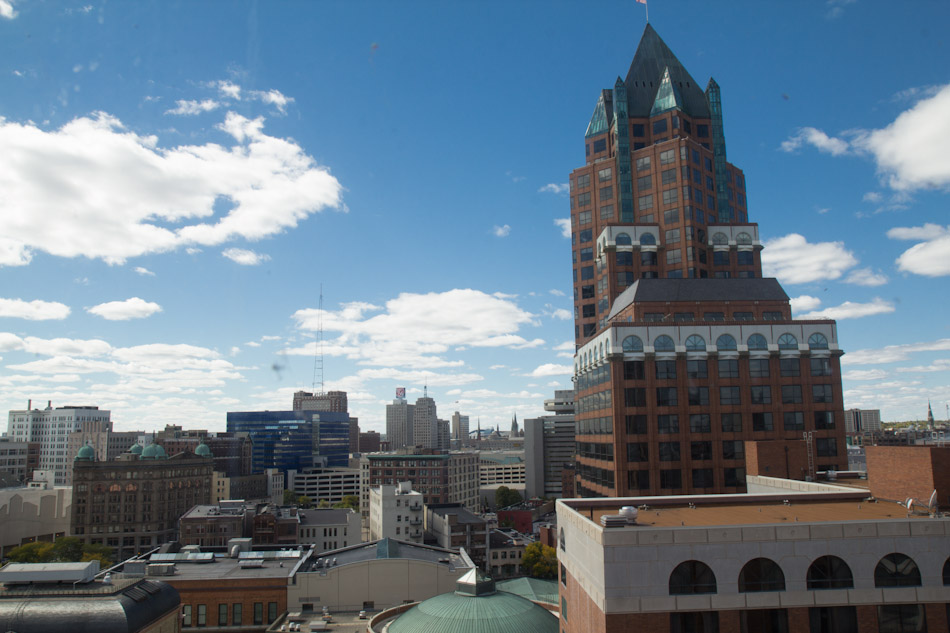Milwaukee Likely Won’t Be Devastated By Climate Change
A report by an insurance adjuster predicts the city will fare much better than other cities.
How might Milwaukee fare as the climate changes, and parts of the country experience more intense weather? A new analysis by Policygenius, an independent insurance broker and online marketplace, found that the city may actually fare pretty well. The Policygenius analysis, which assessed urban cities across the country, ranked Milwaukee at #6 on the list of best-suited cities.
The city that is Wisconsin’s economic engine, the analysis noted, made the list “thanks to its below-average number of days with extreme heat predicted for 2050 — just nine days versus the average of 44 days for the rest of the cities in this study.” Still, Milwaukee and much of the state aren’t immune, and will still experience rising humidity and heat. For the Badger State, climate change means increased temperatures, more rainfall over a shorter period of days, and increased risks of flooding.
Nevertheless, Policygenius found promise in some of the more localized trends in Milwaukee. “While you’d expect a city situated on Lake Michigan to see an above-average threat of flooding,” the analysis read, “that’s not the case. By 2050, just shy of 5% of Milwaukee properties will be in 100-year flood plains, an increase of only 0.35% over today. But its air quality isn’t quite the breath of fresh air you’d expect — just 58% of days in 2021 were considered ‘good’ air quality versus the 63% average for cities in this index.”
In this light, the analysis found that Milwaukee may seem more prepared for climate change than most cities. While it has some favorable traits, the city also had a high “vulnerability score” in the analysis. “The city scores four times lower than the other cities on this top 10 list,” the report reads, referencing Milwaukee’s vulnerability score for the analysis. It points to civil unrest that followed the killing of George Floyd, and increasing violence as potential factors. Still, the report notes that a low vulnerability score “may be indicative of how quickly residents would bounce back after a climate-related disaster.”
Early last month, Milwaukee’s City-County Task Force on Climate and Economic Equity presented a set of recommendations to the Milwaukee Common Council. The recommendations, and the task force’s work was also compiled in a Powerpoint presentation which was presented to the council in March. The city faces several climate-related risks, including extreme storms, heat waves which cause pockets of urban heat islands, and other issues that extend beyond the city limits.
Mid-December of 2021 saw temperatures of 61 degrees in Milwaukee, and 64 degrees in the capital of Madison. These were some of the warmest temperatures ever recorded during the month of December for the two cities. Meanwhile, the national guard warned of brewing storms which could bring 40 mile per hour winds and tornadoes to southwestern Wisconsin. Just a week prior, at least 39 tornadoes broke out across the Midwest, causing at least 88 deaths and costing millions of dollars in damage. Recently, climate scientists from across the globe have joined groups like Extinction Rebellion in civil disobedience actions to push for urgent climate action by governments.
By 2025, Milwaukee aims to draw 25% of its energy from renewable sources. The city-county climate task force has also set a goal of reducing greenhouse emission 45% by 2030, and to achieve net zero emissions by 2050. Green jobs are also a goal for climate activists and elected officials seeking to rejuvenate Milwaukee’s industrial sectors. According to statistics from 2018, about 31% of the city’s greenhouse gas emissions came from residential buildings, 22% from industrial sources, another 22% from commercial buildings, and 21% from transportation.
The task force has recommended promoting green jobs. Other recommendations include establishing community-benefits agreements for publicly funded projects, helping employers to meet climate-related goals, supporting homeowners in converting to renewable energy sources and incorporating energy efficiency strategies into the construction of new homes. Green jobs and climate resilience were a talking point on the campaign trail by recently elected Mayor Cavalier Johnson as well as his opponents including Ald. Marina Dimitrijevic.
Fostering the use of electric vehicles, and developing a city ordinance requiring electric vehicle charging infrastructure in parking lots by 2023 is also recommended. So is increasing the number of multi-family residential buildings, and the promotion of electric vehicle policies with Wisconsin utilities.
Currently the city is seeking a consulting firm to compile many of the task force’s findings into a final report. The report will be made available for public review, and additional analysis will need to be conducted. Meanwhile, Milwaukee will also need to seek funding to get the strategies off the ground.
Milwaukee not a bad city for climate change, report finds was originally published by the Wisconsin Examiner.
Political Contributions Tracker
Displaying political contributions between people mentioned in this story. Learn more.





















